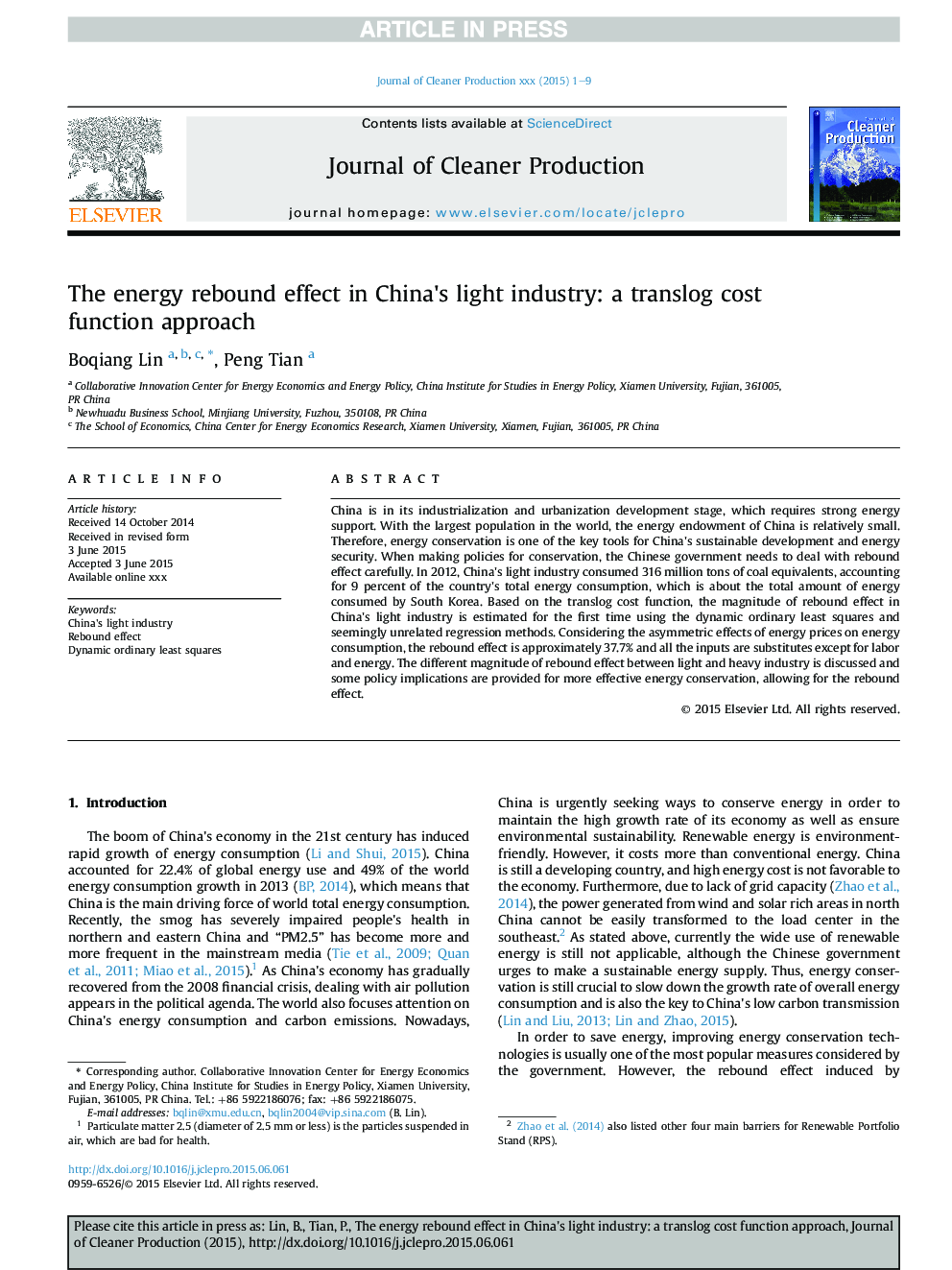| کد مقاله | کد نشریه | سال انتشار | مقاله انگلیسی | نسخه تمام متن |
|---|---|---|---|---|
| 10687867 | 1017962 | 2016 | 9 صفحه PDF | دانلود رایگان |
عنوان انگلیسی مقاله ISI
The energy rebound effect in China's light industry: a translog cost function approach
ترجمه فارسی عنوان
تأثیر بازگشت انرژی در صنایع سبک چین: رویکرد تابع هزینه انتقال
دانلود مقاله + سفارش ترجمه
دانلود مقاله ISI انگلیسی
رایگان برای ایرانیان
کلمات کلیدی
صنایع سبک چین، تأثیر بازتاب، کمترین مربع معمولی دینامیک،
ترجمه چکیده
چین در مرحله توسعه صنعتی و شهری است که نیاز به حمایت قوی انرژی دارد. با توجه به بزرگترین جمعیت جهان، درآمد انرژی چین بسیار کم است. بنابراین، صرفه جویی در انرژی یکی از ابزارهای کلیدی برای توسعه پایدار و امنیت انرژی چین است. دولت چین باید سیاست های مربوط به حفاظت را به دقت بررسی کند. در سال 2012، صنعت نور چینی 316 میلیون تن معادل آن زغال سنگ مصرف می کند که 9 درصد از مصرف کل انرژی کشور را شامل می شود که در کل میزان مصرف انرژی کره جنوبی است. بر اساس تابع هزینه نقل قول، مقدار بازدهی در صنایع سبک چینی برای اولین بار با استفاده از مربعات معمول پویا معمول و روش های رگرسیون ظاهرا غیر مرتبط است. با توجه به اثرات نامتقارن قیمت های انرژی در مصرف انرژی، اثر بازپرداخت تقریبا 37.7٪ و تمام ورودی ها جایگزین به جز نیروی کار و انرژی است. مقدار مختلف بازدهی بین صنعت نور و سنگین مورد بحث قرار گرفته است و برخی از خط مشی ها برای حفاظت از انرژی مؤثرتر ارائه شده است، که امکان بازدهی را فراهم می آورد.
موضوعات مرتبط
مهندسی و علوم پایه
مهندسی انرژی
انرژی های تجدید پذیر، توسعه پایدار و محیط زیست
چکیده انگلیسی
China is in its industrialization and urbanization development stage, which requires strong energy support. With the largest population in the world, the energy endowment of China is relatively small. Therefore, energy conservation is one of the key tools for China's sustainable development and energy security. When making policies for conservation, the Chinese government needs to deal with rebound effect carefully. In 2012, China's light industry consumed 316 million tons of coal equivalents, accounting for 9 percent of the country's total energy consumption, which is about the total amount of energy consumed by South Korea. Based on the translog cost function, the magnitude of rebound effect in China's light industry is estimated for the first time using the dynamic ordinary least squares and seemingly unrelated regression methods. Considering the asymmetric effects of energy prices on energy consumption, the rebound effect is approximately 37.7% and all the inputs are substitutes except for labor and energy. The different magnitude of rebound effect between light and heavy industry is discussed and some policy implications are provided for more effective energy conservation, allowing for the rebound effect.
ناشر
Database: Elsevier - ScienceDirect (ساینس دایرکت)
Journal: Journal of Cleaner Production - Volume 112, Part 4, 20 January 2016, Pages 2793-2801
Journal: Journal of Cleaner Production - Volume 112, Part 4, 20 January 2016, Pages 2793-2801
نویسندگان
Boqiang Lin, Peng Tian,
